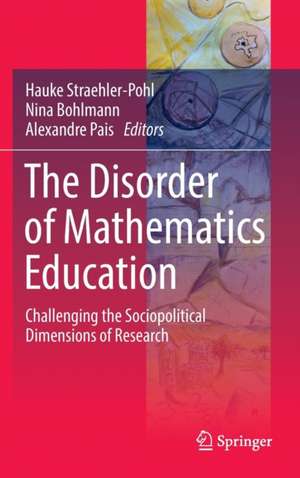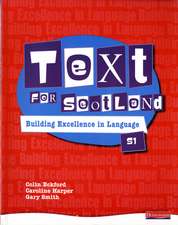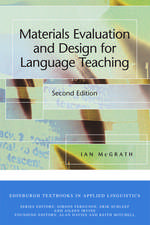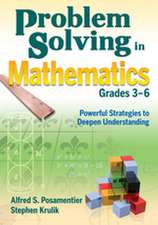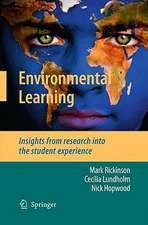The Disorder of Mathematics Education: Challenging the Sociopolitical Dimensions of Research
Editat de Hauke Straehler-Pohl, Nina Bohlmann, Alexandre Paisen Limba Engleză Hardback – 31 aug 2016
| Toate formatele și edițiile | Preț | Express |
|---|---|---|
| Paperback (1) | 642.51 lei 6-8 săpt. | |
| Springer International Publishing – 12 iun 2018 | 642.51 lei 6-8 săpt. | |
| Hardback (1) | 648.89 lei 6-8 săpt. | |
| Springer International Publishing – 31 aug 2016 | 648.89 lei 6-8 săpt. |
Preț: 648.89 lei
Preț vechi: 763.40 lei
-15% Nou
Puncte Express: 973
Preț estimativ în valută:
124.16€ • 130.33$ • 103.06£
124.16€ • 130.33$ • 103.06£
Carte tipărită la comandă
Livrare economică 10-24 aprilie
Preluare comenzi: 021 569.72.76
Specificații
ISBN-13: 9783319340050
ISBN-10: 3319340050
Pagini: 320
Ilustrații: X, 329 p. 32 illus., 12 illus. in color.
Dimensiuni: 155 x 235 x 27 mm
Greutate: 0.65 kg
Ediția:1st ed. 2017
Editura: Springer International Publishing
Colecția Springer
Locul publicării:Cham, Switzerland
ISBN-10: 3319340050
Pagini: 320
Ilustrații: X, 329 p. 32 illus., 12 illus. in color.
Dimensiuni: 155 x 235 x 27 mm
Greutate: 0.65 kg
Ediția:1st ed. 2017
Editura: Springer International Publishing
Colecția Springer
Locul publicării:Cham, Switzerland
Cuprins
Welcome to the Jungle. An Orientation Guide to the Disorder of Mathematics Education.- Section A What Bonds us to Mathematics.- 1 Mathematics Education as Praying Wheel. How Adults Avoid Mathematics by Pushing it onto Children.- 2 Demathematisation and Ideology in Times of Capitalism. Recovering Critical Distance.- 3 The Narcissism of Mathematics Education.- Section B Disordering Narratives of Progress in Mathematics Education.- 4 Revisiting Mathematics For All: A Commentary to Pais’s Critique.- 5 Ethnomathematical Barters.- 6 Installing “Good Mathematics Teaching”: Hegemonic Strategies and Alliances of Researchers.- 7 Communicating Research in Mathematics Education: Theoretical and Ethical Problems.- 8 Mathematics Teachers as Products and Agents: To Be and not to Be, that’s the Point.- 9 Technologies of (Re)production in Mathematics Education Research: Performances of Progress.- Section C Disordering School Mathematics.- 10 A Socio-Critical Analysis of Students’ Perceptions of Mathematics.- 11 Interrupting Passivity: Attempts to Interrogate Political Agency in Palestinian School Mathematics.- 12 Assessment in Mathematics Education: A Gate-keeping Dispositive.- 13 Expressions of the Commodity Form Alienation and Mathematics Education.- The Effects of School Geometry in the Shaping of a Desired Child.- 15 Rationality and belief in learning mathematics.- Section D Disordering the Role of the Mathematics Education Researcher.- 16 Disordered Order Ordered Disorder Threads Folds and Artistic Action.- 17 Reflections on Research Positioning Where the Math Is and Where the People Are.- 18 Urban Boundaries Space Disturbing Choices and the Place of the Critical Research Researcher in the Capitalist Wile.
Notă biografică
Hauke Straehler Pohl works as a researcher and teacher educator at the Freie Universität Berlin. His research interests evolve around the sociology of, the politics of, and the philosophy of education in general as well as in mathematics education in particular. His particular interest is devoted to the social pathologies that impede schools from creating the conditions for a “good life” within the Social for everyone.
Nina Bohlmann works as a researcher at the Faculty of Education, Freie Universität Berlin. She is mainly interested in issues of social inequality with a focus on mathematics education and investigates mechanisms of the reproduction of social inequality in classroom interaction. She aims at a further theorizing and approaches this research area mainly from a micro-sociological perspective. In addition to her research she is involved in the teacher training of pre-service primary school teachers.
Alexandre works in Manchester (Faculty of Education, Manchester Metropolitan University) where he reads, writes, teaches and talks about all aspects of educational research amenable to philosophical investigation. He is a scholar of Lacan and Žižek.
Nina Bohlmann works as a researcher at the Faculty of Education, Freie Universität Berlin. She is mainly interested in issues of social inequality with a focus on mathematics education and investigates mechanisms of the reproduction of social inequality in classroom interaction. She aims at a further theorizing and approaches this research area mainly from a micro-sociological perspective. In addition to her research she is involved in the teacher training of pre-service primary school teachers.
Alexandre works in Manchester (Faculty of Education, Manchester Metropolitan University) where he reads, writes, teaches and talks about all aspects of educational research amenable to philosophical investigation. He is a scholar of Lacan and Žižek.
Textul de pe ultima copertă
Research within a socio-political paradigm or “turn” has been gradually recognized and institutionalized as an important part of mathematics education. This book focuses on the neglected problems, tensions and contradictions evoked by this process. The authors do this by challenging current regimes of truth about mathematics education; by identifying how recent technological developments challenge or suspend contemporary conceptions of mathematics education; by critiquing the ideological entanglement of mathematics, its education and schooling with capitalism; by self-reflective analyses of researchers' impacts on shaping what is and can be perceived as the practice of mathematics education (research); and by confronting main-stream mathematics education with socio-political contexts that are usually neglected. In this way, "mathematical rationality" becomes contextualized within contemporary society, where it reproduces itself through technologies, social practices, media and other spheres of social life.
Caracteristici
Presents new insights into the role of mathematics education in shaping contemporary society Celebrates diversity and dissent as an intrinsic feature of mathematics education research Includes multi-national perspectives on the "sociopolitical paradigm" in mathematics education
